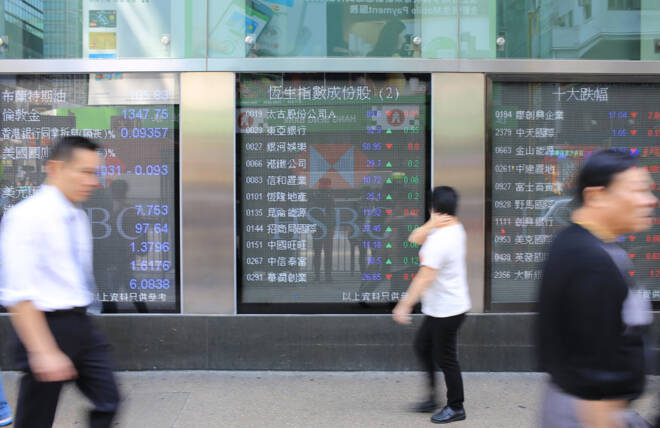Advertisement
Advertisement
Hang Seng Index News: Losses Deepen on US Jobs Report and Margin Squeeze Fears
By:
Key Points:
- Hang Seng Index falls 1.24% on July 4 as strong US jobs data dashes hopes for a July or September Fed rate cut.
- Tech and EV stocks tumble on margin squeeze fears; Alibaba down 2.54%, JD.com 1.44%, BYD 1.22%.
- US-Vietnam trade deal adds pressure on China’s exporters with new tariffs on direct and transshipped goods.
Hang Seng Dips as US Jobs Data Crushes Rate Cut Hopes
Overnight US labor market sank market bets on Fed rate cuts in Q3 2025, an ominous sign for Chinese tech companies facing profit margin squeezes over intensifying competition.
On Friday, July 4, the Hang Seng Index extended its losses from Thursday, with tech heavyweights and electric vehicle (EV) makers pulling the Index into the red.
Economic data, trade headlines, and central bank policy signals will continue to influence risk sentiment. These factors could determine whether the Hang Seng Index will break below 23,500 or revisit 24,500.
Hang Seng Index Slides as US Jobs Report Shuts Door on July Fed Rate Cut
US equity markets rallied on Wednesday, July 3, as an upbeat US Jobs Report eased fears of a US recession. The Nasdaq Composite Index led the gains, climbing 1.02% and closing at a record high. Meanwhile, the Hang Seng Index dropped 1.24% to 23,772 in early trading on July 4.
EV and tech stocks stumbled, with Mainland China markets also posting early losses. The CSI 300 and Shanghai Composite Index dipped 0.13% and 0.10%, respectively.
EV and Tech Stocks Fall on Margin Squeeze Concerns
Falling bets on Fed rate cuts in July and September triggered a tech sector sell-off. A higher-for-longer Fed rate path could raise borrowing costs, putting further strain on Chinese tech companies facing increased competition. June’s private sector PMIs revealed weakening overseas demand fueling domestic competition, forcing firms to absorb rising input costs.
The US-Vietnam trade agreement could further impact price pressures. Vietnam agreed to a 20% tariff on direct exports to the US and a 40% levy on transshipping to the US, potentially impacting China’s exporters.
Alibaba (9988) dropped 2.54%, while JD.com (09618) was down 1.44%, leaving the Hang Seng TECH Index with a 1.68% morning loss. EV stocks BYD (01211) and Li Auto (02015) declined by 1.22% and 1.16%, respectively.
US Jobs Report Hits Trump’s Press for Lower Interest Rates
On July 4, the US Jobs Report showed nonfarm payrolls increased 147k in June after a 144k rise in May, beating forecasts. The unemployment rate fell to 4.1%, down from 4.2% in May, though a lower participation rate contributed to the lower rate. Despite wage growth slowing, markets took the headline numbers as a cue for the Fed to keep rates steady for longer.
According to the CME FedWatch Tool, the chances of a July Fed rate cut tumbled from 23.8% on July 2 to 5.2% on July 3. The probability of a September Fed move also dimmed, dropping from 93.7% to 67.2%.
Technical Setup: 24,500 Resistance or Drop Below 23,500?
On July 4, the Hang Seng Index fell back to the May-June congestion zone. Despite the extended loss, the Index continued to trade above its 50-day Exponential Moving Average (EMA), indicating a bullish bias.
The Index may target the 24,000 level if China negotiates the removal of US tariffs or Beijing introduces fresh stimulus to expedite the transition to a consumption-led economy. A sustained move through 24,000 could pave the way to the June 25 high of 24,533, bringing the March high of 24,874 into play. Conversely, a drop below the 50-day EMA and the 23,500 mark could expose the crucial 23,000 support level.
Hang Seng Technical Outlook
- Resistance: 24,000, 24,533, and then 24,874.
- Support: The 50-day EMA at 23,506, then 23,000.
- Short-term Bias: Bullish but hinged on US-China trade headlines and central bank policy cues.
Hang Seng Index Forecast: Will the Index Break 24,000 or Drop Toward 23,000?
The Hang Seng Index returned to its congestion zone while trading above the 50-day EMA amid shifting sentiment toward the Fed rate path.
Despite the US-China trade agreement, the US trade deal with Vietnam targeted China with higher transshipping tariffs. Weakening overseas demand may further impact China’s corporate profits and labor market. Existing US tariffs on China and the absence of fresh stimulus from Beijing were also headwinds. These factors could push the Index below 23,500. Conversely, the removal of tariffs and fresh stimulus may lift sentiment, sending the Index toward the March high of 24,874.
What’s next for the Hang Seng? Stay informed with real-time updates as geopolitical risks and US-China developments drive sentiment. Follow our live coverage and consult our economic calendar.
About the Author
Bob Masonauthor
With over 28 years of experience in the financial industry, Bob has worked with various global rating agencies and multinational banks. Currently he is covering currencies, commodities, alternative asset classes and global equities, focusing mostly on European and Asian markets.
Advertisement
